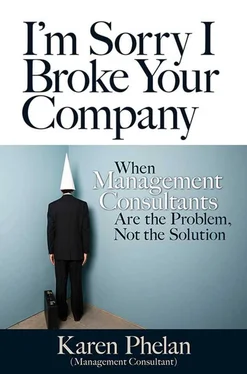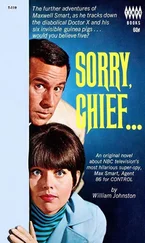Karen Phelan - I'm Sorry I broke Your Company
Здесь есть возможность читать онлайн «Karen Phelan - I'm Sorry I broke Your Company» весь текст электронной книги совершенно бесплатно (целиком полную версию без сокращений). В некоторых случаях можно слушать аудио, скачать через торрент в формате fb2 и присутствует краткое содержание. Город: San Francisco, Год выпуска: 2013, ISBN: 2013, Издательство: Berrett-Koehler Publishers, Жанр: management, popular_business, на английском языке. Описание произведения, (предисловие) а так же отзывы посетителей доступны на портале библиотеки ЛибКат.
- Название:I'm Sorry I broke Your Company
- Автор:
- Издательство:Berrett-Koehler Publishers
- Жанр:
- Год:2013
- Город:San Francisco
- ISBN:978-1-60994-740-8; 978-1-60994-741-5
- Рейтинг книги:3 / 5. Голосов: 1
-
Избранное:Добавить в избранное
- Отзывы:
-
Ваша оценка:
- 60
- 1
- 2
- 3
- 4
- 5
I'm Sorry I broke Your Company: краткое содержание, описание и аннотация
Предлагаем к чтению аннотацию, описание, краткое содержание или предисловие (зависит от того, что написал сам автор книги «I'm Sorry I broke Your Company»). Если вы не нашли необходимую информацию о книге — напишите в комментариях, мы постараемся отыскать её.
I'm Sorry I broke Your Company — читать онлайн бесплатно полную книгу (весь текст) целиком
Ниже представлен текст книги, разбитый по страницам. Система сохранения места последней прочитанной страницы, позволяет с удобством читать онлайн бесплатно книгу «I'm Sorry I broke Your Company», без необходимости каждый раз заново искать на чём Вы остановились. Поставьте закладку, и сможете в любой момент перейти на страницу, на которой закончили чтение.
Интервал:
Закладка:
Lets get back to the self-actualization school of leadership. How does anyone achieve self-actualization without pursuing her own interests? Look at what shaped Steve Jobs. He had an interest in computers that he pursued on his own. After dropping out of Reed College, he audited a calligraphy class because he thought it was interesting. This sparked his whole obsession with good design. He sought self-enlightenment in India, only to realize that Thomas Edison had a greater impact on the world than any swami. None of the events that shaped Steve Jobs were company or school sanctioned.
When I look at my own career and consider what helped me become a better person and also a better leader, most of those weren't company sanctioned, either. The top item is parenthood. I became a much better manager after having children because I learned how to deal with other people on their terms and not always my own. You can't tell a two-year-old that you're the boss, and he needs to do what you say. I mean, you can, but it won't get you anywhere. Regarding training, the classes that helped me most were on systems dynamics, neurolinguistic programming, and a women's leadership program that stressed the importance of relationships. Only the last one was part of corporate training, and it was a recommended external program, not a mandated one. There is such a big difference between choosing to be there and having to be there.
The last big problem with this attempt at standardizing the workforce is that it inhibits the chance of self-actualization at work. If all your development is through mandatory programs and you get stuck in a job for which you are ill suited, your chances of finding a personal passion at work are slim to none. If you haven't found a personal passion, how can you create a compelling vision for the future that inspires others? Remember our schools of thought on great leaders — self-actualized achievers, visionary doers, or narcissists? If self-actualization and finding your passion have become harder due to rigid competency requirements, who is left? It's scary to think that through the widespread use of talent management systems, companies may now be ensuring that the only people who can rise to the top are the narcissists.
We need to get rid of the laundry list of leadership attributes that employees are required to master. No one really knows what traits make a good leader. Get rid of the copious mandatory training and e-learning classes. Do offer training to your employees, but make it a menu of in-house, external, and «you get to choose» classes. For internal programs, determine a small set of skills, perhaps five, that you would like all your employees to master. You cant ever go wrong with communications skills like coaching, feedback, and conflict resolution. You may consider a brainstorming, problem-solving, or creativity tool. Offer onboarding and new manager training. But encourage employees to seek training and conferences of their own choosing and to learn things no one has ever heard of yet. Encourage everyone to share the new and crazy things they've learned with others. Remember that the reason we work in groups is so that we can benefit from the strengths of others and offset their weaknesses. Not everyone needs to be competent at everything. This is why we work in organizations.
But what about identifying the future leaders of a company and developing that talent? This is still a vital function a company needs to survive. Whether it is called «drive,» «passion,» «singular pursuit,» «ambition,» or «a call to a higher purpose,» all leaders have a will to succeed. It may be driven by an altruistic goal or by inner narcissism, but leaders all persist in achieving their goals. They are very easy to identify in the workplace. You know — that person who gets things done and volunteers to lead teams, the one whom everyone knows, the go-to person? Yeah, that's the one. And if you can't find enough of those, let your employees apply to leadership programs with the understanding that the application process will be a lot of work. Only the ones with ambition will apply.
That will be $2,500 please. You’re welcome.
8. Out of the Boxes, Charts, and Spreadsheets
How to Think Without Consultants
Frederick Taylor, the father of scientific management, was among the very first management consultants and perhaps the first true management guru. His 1911 book, The Principles of Scientific Management , was a best seller for several decades, and his ideas influenced the management of many big American corporations. He was famous in his day, giving many lectures, consulting to well-known companies, and providing advice to the government. Perhaps his greatest legacy is that he helped develop the curriculum at the Harvard Business School, where he also lectured. Even today, the ideas of «Taylorism,» associated with monitoring and measuring and finding the one optimized way of performing a task, have outlived the man by a century. Matthew Stewart, in his book, The Management Myth: Why the Experts Keep Getting It Wrong , said about Taylor, «In place of verifiable data and reproducible methodologies, he provided only anecdotes, embellished with speciously precise numbers and arcane formulas of indeterminate provenance.» Apparently, Taylor was full of bull: performing back-of-the-envelope calculations that had no bearing in reality, overestimating benefits, overcharging his clients, and proclaiming the success of his methods by fudging data — providing the blueprint for the modern management consultant.
Taylor is a good example to examine because we have a century of hindsight with which to judge his ideas. While scientific management was all the rage back in the industrial era, the term «Taylorism» today has mostly a pejorative connotation. Like most great thinkers, Taylor had some very useful ideas and some harmful ones. Some of his useful concepts were to
• Analyze work to determine how to do tasks more efficiently
• Train employees rather than leave them to their own devices
• Find tasks that fit employees' capabilities rather than assign jobs willy-nilly
• Give ample rest breaks to prevent both mental and physical fatigue
• Provide incentives to induce workers to produce more
While many of his ideas are still in practice, his name will be forever associated with the rote, obedient, mechanistic approach to work that ruled the assembly lines a century ago. He believed that thinking work should be separated from manual and menial work and that only a few workers were capable of thinking. He thought managers, the thinkers, should design the work and create standards, while the rest of the employees should be subservient to the managers and follow the rigid standards. This methodology had the effect of dehumanizing the workplace and even resulted in a strike at the Watertown Arsenal. He also never factored human variability into his stopwatch experiments. His most famous case involved finding the most efficient way to shovel pig iron. He chose to observe the strongest and biggest operator to determine the most effective methods (and based his benefit calculations on this persons ability) without considering differences in height, strength, or body type. He also asked the laborer to work as fast as he could, a rate that was unsustainable over long durations.
While Taylorism is mostly repudiated today, the idea that businesses can monitor, measure, and optimize their way to success still survives in modern management methods. We still call upon the mantras of the Taylor efficiency movement: «Work smarter, not harder»; «Do more with less.» We still believe measurements are the key to management. We still call it «management science.» But where Taylor, and many subsequent management consultants, got it wrong is that management is not a science.
Читать дальшеИнтервал:
Закладка:
Похожие книги на «I'm Sorry I broke Your Company»
Представляем Вашему вниманию похожие книги на «I'm Sorry I broke Your Company» списком для выбора. Мы отобрали схожую по названию и смыслу литературу в надежде предоставить читателям больше вариантов отыскать новые, интересные, ещё непрочитанные произведения.
Обсуждение, отзывы о книге «I'm Sorry I broke Your Company» и просто собственные мнения читателей. Оставьте ваши комментарии, напишите, что Вы думаете о произведении, его смысле или главных героях. Укажите что конкретно понравилось, а что нет, и почему Вы так считаете.












